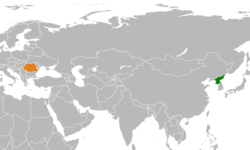The Democratic People's Republic of Korea (DPRK) and Romania have maintained limited bilateral relations since the Romanian Revolution of December 1989. Relations between the two countries began on October 26, 1948, when Romania was part of the Eastern Bloc. Romania has an embassy in Pyongyang and North Korea has an embassy in Bucharest.
 | |
North Korea |
Romania |
|---|---|
| Diplomatic mission | |
| DPRK Embassy, Bucharest | Embassy of Romania, Pyongyang |
| Envoy | |
| Kim Son Gyong | Ambassador Andy Avram, Chargé d'Affaires a.i. |
Historical overview
editThe Romanian People's Republic formally recognized the Democratic People's Republic of Korea on October 26, 1948 as the sole legitimate government of the entire Korean Peninsula. Both countries were allies during the Korean War in the early-1950s.[1] In the following years, the two countries had little contact.[2]
On June 15, 1971, the president of the newly renamed Socialist Republic of Romania, Nicolae Ceaușescu, visited North Korea.[3][4][5][6] He took great interest in the idea of total national transformation as embodied in the programs of the Workers' Party of Korea. He was also inspired by the personality cult of Kim Il Sung. According to the British journalist Edward Behr, Ceaușescu admired Kim as a leader because he dominated his nation and broke free from Soviet control, combining totalitarian methods with ultra-nationalist and communist ideologies.[7] Behr wrote that the possibility for "vast Potemkin villages for the hoodwinking of gullible foreign guests" that Ceaușescu had seen in North Korea was something that never seemed to have crossed his mind before.[7]
Upon his return to Romania, Ceaușescu began to emulate North Korea's system, influenced by Kim's Juche philosophy. He issued the July Theses, a set of proposals that tightened government control over Romanian media, promoted nationalism, and intensified his personality cult. North Korean books on Juche were translated into Romanian and widely distributed inside the country.[8] The militaries of both countries began to co-operate on sensitive issues.[2] At the same time, Romania had a rapprochement with the United States. In 1973, North Korea tried to use Romania as an intermediary with the US, but the Romanian diplomats did not want to harm their developing relationship with the US.[2]
In 1978, Romanian painter Doina Bumbea was abducted by the North Korean government. This may have been with the intention of providing American defectors in the country with non-Korean wives to avoid the birth of ethnically mixed Koreans.[9] Romanian officials and governmental institutions have been left aware of Bumbea's case, but they have not given much importance to it.[10]
Post-Communist Romania
editRelations between North Korea and Romania deteriorated after Romania's Communist regime fell. Ceausescu's execution during the 1989 Romanian Revolution and the 1991 dissolution of the Soviet Union resulted in Romania rejecting totalitarian ideologies still promoted in the DPRK. Romania allied itself with nations hostile to the DPRK: it established relations with North Korea's rival the Republic of Korea (South Korea) on March 30, 1990, entered NATO in 2004, and joined the European Union in 2007.[11] However, it continues to maintain ties in the educational field.[2]
In 2016, the Romanian Foreign Affairs Ministry reacted to North Korea's hydrogen bomb test that occurred in January with a statement of concern that this test posed "... a challenge to peace and security in the region".[12]
In October 2021, Romania closed its embassy in North Korea, possibly only temporarily, as a result of the strict COVID-19 pandemic containment measures taken by the North Korean government that made the operation of the embassy and the entry and exit to the country highly complicated. Before this, Romania was the only country in the European Union to have a diplomatic embassy in North Korea. The embassy may not reopen due to high maintenance costs.[13]
See also
editReferences
edit- ^ "Romania's "Fraternal Support" to North Korea during the Korean War, 1950-1953 | Wilson Center". www.wilsoncenter.org.
- ^ a b c d Rinna, Anthony V (20 November 2018). "Comrades no more: North Korea-Romania relations, 70 years on". NK News.
- ^ *Cioroianu, Adrian, Pe umerii lui Marx. O introducere în istoria comunismului românesc ("On the Shoulders of Marx. An Incursion into the History of Romanian Communism"), Editura Curtea Veche, Bucharest, 2005, ISBN 973-669-175-6, p. 489.
- ^ Tismăneanu, Vladimir, Stalinism pentru eternitate, Polirom, Iași, 2005 ISBN 973-681-899-3 (translation of Stalinism for All Seasons: A Political History of Romanian Communism, University of California Press, Berkeley, 2003, ISBN 0-520-23747-1), p. 2412.
- ^ Minutes of the Romanian Politburo Meeting Concerning Nicolae Ceaușescu's Visit to China, North Korea, Mongolia, and Vietnam Archived 2016-01-20 at the Wayback Machine, Parallel History Project on Cooperative Security
- ^ "Nicolae Ceausescu - vizita in Coreea de Nord (1971)" – via www.youtube.com.
- ^ a b Behr, Edward Kiss the Hand You Cannot Bite, New York: Villard Books, 1991 page 195.
- ^ Post, Jerrold M. (2014-11-24). Narcissism and Politics: Dreams of Glory. Cambridge University Press. pp. 103. ISBN 978-1-107-00872-4.
- ^ "N. Korea kidnap victim's brother wants Pyongyang to come clean". Bangkok Post. 17 March 2014.
- ^ Dumitrescu, A. (16 April 2014). "Interviu. Povestea româncei răpite de Coreea de Nord pentru instruirea spionilor". stiripesurse.ro (in Romanian).
- ^ Tunney, Kelly (January 7, 1990). "South Koreans Watch Romania, Think of North". Los Angeles Times. Associated Press. Archived from the original on 9 December 2015.
- ^ no by-line (2016-06-01). "MFA position on Democratic People's Republic of Korea claim of hydrogen bomb test" (Press release). Romania: Ministry of Foreign Affairs, Romania. Retrieved 2017-07-19.
- ^ Last embassy from EU country shuts down in Pyongyang October 10, 2021